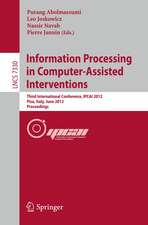Social Collective Intelligence: Combining the Powers of Humans and Machines to Build a Smarter Society: Computational Social Sciences
Editat de Daniele Miorandi, Vincenzo Maltese, Michael Rovatsos, Anton Nijholt, James Stewarten Limba Engleză Hardback – 30 sep 2014
Social Collective Intelligence opens a number of challenges for researchers in both computer science and social sciences; at the same time it provides an innovative approach to solve challenges in diverse application domains, ranging from health to education and organization of work.
The book will provide a cohesive and holistic treatment of Social Collective Intelligence, including challenges emerging in various disciplines (computer science, sociology, ethics) and opportunities for innovating in various application areas.
By going through the book the reader will gauge insight and knowledge into the challenges and opportunities provided by this new, exciting, field of investigation. Benefits for scientists will be in terms of accessing a comprehensive treatment of the open research challenges in a multidisciplinary perspective. Benefits for practitioners and applied researchers will be in terms of access to novel approaches to tackle relevant problems in their field. Benefits for policy-makers and public bodies representatives will be in terms of understanding how technological advances can support them in supporting the progress of society and economy.
| Toate formatele și edițiile | Preț | Express |
|---|---|---|
| Paperback (1) | 331.91 lei 6-8 săpt. | |
| Springer International Publishing – 22 sep 2016 | 331.91 lei 6-8 săpt. | |
| Hardback (1) | 338.16 lei 6-8 săpt. | |
| Springer International Publishing – 30 sep 2014 | 338.16 lei 6-8 săpt. |
Din seria Computational Social Sciences
- 15%
 Preț: 649.39 lei
Preț: 649.39 lei - 18%
 Preț: 964.54 lei
Preț: 964.54 lei - 15%
 Preț: 643.34 lei
Preț: 643.34 lei - 15%
 Preț: 640.88 lei
Preț: 640.88 lei -
 Preț: 390.63 lei
Preț: 390.63 lei -
 Preț: 395.47 lei
Preț: 395.47 lei - 20%
 Preț: 662.11 lei
Preț: 662.11 lei - 20%
 Preț: 618.05 lei
Preț: 618.05 lei - 20%
 Preț: 901.28 lei
Preț: 901.28 lei - 20%
 Preț: 628.79 lei
Preț: 628.79 lei - 20%
 Preț: 649.93 lei
Preț: 649.93 lei - 20%
 Preț: 761.44 lei
Preț: 761.44 lei - 15%
 Preț: 643.48 lei
Preț: 643.48 lei - 18%
 Preț: 1117.34 lei
Preț: 1117.34 lei - 20%
 Preț: 1169.47 lei
Preț: 1169.47 lei -
 Preț: 432.12 lei
Preț: 432.12 lei -
 Preț: 393.13 lei
Preț: 393.13 lei - 18%
 Preț: 887.38 lei
Preț: 887.38 lei -
 Preț: 383.93 lei
Preț: 383.93 lei - 20%
 Preț: 241.67 lei
Preț: 241.67 lei - 15%
 Preț: 523.07 lei
Preț: 523.07 lei -
 Preț: 428.07 lei
Preț: 428.07 lei - 15%
 Preț: 693.06 lei
Preț: 693.06 lei -
 Preț: 487.75 lei
Preț: 487.75 lei - 20%
 Preț: 1166.19 lei
Preț: 1166.19 lei - 15%
 Preț: 696.02 lei
Preț: 696.02 lei - 20%
 Preț: 1156.62 lei
Preț: 1156.62 lei - 25%
 Preț: 470.31 lei
Preț: 470.31 lei
Preț: 338.16 lei
Preț vechi: 422.70 lei
-20% Nou
Puncte Express: 507
Preț estimativ în valută:
64.71€ • 67.15$ • 54.09£
64.71€ • 67.15$ • 54.09£
Carte tipărită la comandă
Livrare economică 15-29 martie
Preluare comenzi: 021 569.72.76
Specificații
ISBN-13: 9783319086804
ISBN-10: 3319086804
Pagini: 276
Ilustrații: VIII, 276 p. 33 illus., 20 illus. in color.
Dimensiuni: 155 x 235 x 17 mm
Greutate: 0.58 kg
Ediția:2014
Editura: Springer International Publishing
Colecția Springer
Seria Computational Social Sciences
Locul publicării:Cham, Switzerland
ISBN-10: 3319086804
Pagini: 276
Ilustrații: VIII, 276 p. 33 illus., 20 illus. in color.
Dimensiuni: 155 x 235 x 17 mm
Greutate: 0.58 kg
Ediția:2014
Editura: Springer International Publishing
Colecția Springer
Seria Computational Social Sciences
Locul publicării:Cham, Switzerland
Public țintă
ResearchCuprins
From the Contents: Part I Foundations.- Towards the Ethical Governance of Smart Society.- Collective Intelligence and Algorithmic Governance of Socio-Technical Systems.- Part II Technologies.- Privacy in Social Collective Intelligence Systems.- The Future of Social is Personal: The Potential of the Personal Data Store.- Part III Applications and Case Studies.- Surfacing Collective Intelligence with Implications for Interface Design in Massive Open Online Courses.- Who Were Where When?—On the Use of Social Collective Intelligence in Computational Epidemiology.
Recenzii
“The volume aims at endorsing a style of research development and a research culture oriented towards making the society smarter and safer. … it offers knowledge, information and high-level expertise in a new area of study widely open for students in social and political sciences as well as in computer sciences and the sciences of the artificial: artificial intelligence, artificial life, machine learning, artificial autonomous agents, agent-based systems or complex adaptive systems.” (Camelia Florela Voinea, JASSS, jasss.soc.surrey.ac.uk, Vol. 21 (1), 2018)
“The book offers very interesting material for a wide range of readers: researchers, PhD students, and practitioners in multidisciplinary research areas that includeintelligent systems. The presented topic is contemporary and attractive, and offers innovative ideas, open questions, and challenges for future research. The physical and technical quality of the book is very good.” (M. Ivanović, Computing Reviews, February, 2015)
“The book offers very interesting material for a wide range of readers: researchers, PhD students, and practitioners in multidisciplinary research areas that includeintelligent systems. The presented topic is contemporary and attractive, and offers innovative ideas, open questions, and challenges for future research. The physical and technical quality of the book is very good.” (M. Ivanović, Computing Reviews, February, 2015)
Textul de pe ultima copertă
The book focuses on Social Collective Intelligence, a term used to denote a class of socio-technical systems that combine, in a coordinated way, the strengths of humans, machines and collectives in terms of competences, knowledge and problem solving capabilities with the communication, computing and storage capabilities of advanced ICT.
Social Collective Intelligence opens a number of challenges for researchers in both computer science and social sciences; at the same time it provides an innovative approach to solve challenges in diverse application domains, ranging from health to education and organization of work.
The book will provide a cohesive and holistic treatment of Social Collective Intelligence, including challenges emerging in various disciplines (computer science, sociology, ethics) and opportunities for innovating in various application areas.
By going through the book the reader will gauge insight and knowledge into the challenges and opportunities provided by this new, exciting, field of investigation. Benefits for scientists will be in terms of accessing a comprehensive treatment of the open research challenges in a multidisciplinary perspective. Benefits for practitioners and applied researchers will be in terms of access to novel approaches to tackle relevant problems in their field. Benefits for policy-makers and public bodies representatives will be in terms of understanding how technological advances can support them in supporting the progress of society and economy.
Social Collective Intelligence opens a number of challenges for researchers in both computer science and social sciences; at the same time it provides an innovative approach to solve challenges in diverse application domains, ranging from health to education and organization of work.
The book will provide a cohesive and holistic treatment of Social Collective Intelligence, including challenges emerging in various disciplines (computer science, sociology, ethics) and opportunities for innovating in various application areas.
By going through the book the reader will gauge insight and knowledge into the challenges and opportunities provided by this new, exciting, field of investigation. Benefits for scientists will be in terms of accessing a comprehensive treatment of the open research challenges in a multidisciplinary perspective. Benefits for practitioners and applied researchers will be in terms of access to novel approaches to tackle relevant problems in their field. Benefits for policy-makers and public bodies representatives will be in terms of understanding how technological advances can support them in supporting the progress of society and economy.
Caracteristici
Features a holistic multidisciplinary perspective on social collective intelligence, including foundational approaches, enabling technologies, and applications/case studies Contains a taxonomy of research challenges to be tackled within various disciplines (computer science and social sciences) Includes a number of chapters related to specific applications from experts in the field and description of concrete and tangible case studies Aims at becoming the reference handbook for researchers and practitioners in the emerging field of social collective intelligence





















